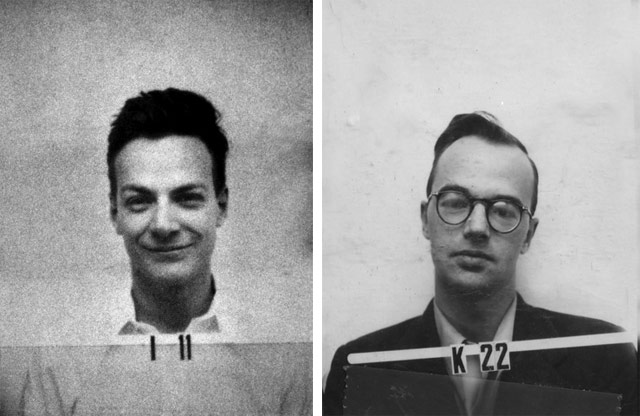Alex Wellerstein took all of the badge photos of the people who worked on the atomic bomb project during World War II at Los Alamos and made a huge image out of them.

I just finished reading Genius, James Gleick’s excellent biography of Richard Feynman. Here’s Feynman (left) and his friend Klaus Fuchs, whose car he used to borrow on the weekends to visit his ailing wife in Albuquerque.

After the war, Fuchs was revealed to be a Soviet spy. If you’re at all interested in the Manhattan Project and the espionage surrounding it and somehow have not read Richard Rhodes’ The Making of the Atomic Bomb and Dark Sun, do so now…they are two of my all-time favorite books. (via greg.org)
Now that he has a book coming out on the subject of genius and high achievement, the New Yorker finally lets Malcolm Gladwell write about David Galenson’s work on age and innovation. (A previous effort was Gladwell’s first article to be rejected by The New Yorker.) For an overview of Galenson’s work, check out my post from August.
The most interesting bit of Gladwell’s piece is his discussion of the economics of the two different types of artist. The conceptual artist’s talent is noticed and rewarded immediately. But conceptual innovators need more help to reach their full potential.
Sharie was Ben’s wife. But she was also-to borrow a term from long ago-his patron. That word has a condescending edge to it today, because we think it far more appropriate for artists (and everyone else for that matter) to be supported by the marketplace. But the marketplace works only for people like Jonathan Safran Foer, whose art emerges, fully realized, at the beginning of their career, or Picasso, whose talent was so blindingly obvious that an art dealer offered him a hundred-and-fifty-franc-a-month stipend the minute he got to Paris, at age twenty. If you are the type of creative mind that starts without a plan, and has to experiment and learn by doing, you need someone to see you through the long and difficult time it takes for your art to reach its true level.
Gladwell discusses the article in a podcast and will be answering reader questions about it later in the week.
The Amazon page for Malcolm Gladwell’s new book is up. From here, we learn that the full title is “Outliers: Why Some People Succeed and Some Don’t” and what the cover looks like. Here’s the description:
In this stunning new book, Malcolm Gladwell takes us on an intellectual journey through the world of “outliers” — the best and the brightest, the most famous and the most successful. He asks the question: what makes high-achievers different? His answer is that we pay too much attention to what successful people are like, and too little attention to where they are from: that is, their culture, their family, their generation, and the idiosyncratic experiences of their upbringing. Along the way he explains the secrets of software billionaires, what it takes to be a great soccer player, why Asians are good at math, and what made the Beatles the greatest rock band.
And an excerpt from the Little, Brown catalog:
Outliers is a book about success. It starts with a very simple question: what is the difference between those who do something special with their lives and everyone else? In Outliers, we’re going to visit a genius who lives on a horse farm in Northern Missouri. We’re going to examine the bizarre histories of professional hockey and soccer players, and look into the peculiar childhood of Bill Gates, and spend time in a Chinese rice paddy, and investigate the world’s greatest law firm, and wonder about what distinguishes pilots who crash planes from those who don’t. And in examining the lives of the remarkable among us — the brilliant, the exceptional and the unusual — I want to convince you that the way we think about success is all wrong.
This doesn’t sound exactly what I had heard his new book was going to be.
A few days ago, New Yorker writer Malcolm Gladwell noted that he’s almost finished with his third book. I’ve learned that the subject of this book is the future of the workplace with subtopics of education and genius.
I guess if you flip those around, that describes Outliers marginally well. According to Amazon, the book is due on November 18, 2008. (thx, kyösti)
This seems familiar:
It made Feynman think wistfully about the days before the future of science had begun to feel like his mission — the days before physicists changed the universe and became the most potent political force within American science, before institutions with fast-expanding budgets began chasing nuclear physicists like Hollywood stars. He remembered when physics was a game, when he could look at the graceful narrowing curve in three dimensions that water makes as it streams from a tap, and he could take the time to understand why.







Stay Connected